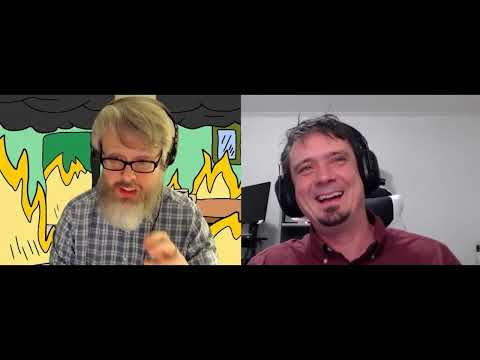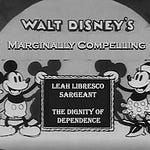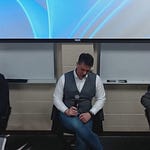This week I interviewed Josh Centers, an author, homesteader, and prepper who is just handing out prepping advice like candy at Unprepared.life. We talk about prepping, nuclear war, positive mindsets, and how weird people get about the smallest things on the internet.
Josh was Twitter’s main character (the person everyone is talking about) after this tweet a couple weeks ago.
I found the outrage over this tweet inexplicable. Obviously, if you want to survive nuclear war, you’re going to need realistic optimism and have a positive mental attitude. It would also help if you did some basic preparation… just in case.
When I was a teenager, a lot of people in my church got very worked up over the Y2K bug and started prepping for a major social, economic, and governmental disruption that did not occur. That was my introduction to “prepping”, and it was a poor one. My family did well out of that experience. My parents didn’t buy barely edible long-term food supplies as many of our friends had. My mom just got a lot of extra canned food and dried goods that she would probably end up using anyway (and she did).
That “big event that changes everything” is not Josh’s style of prepping. He talked about getting on the ground floor of preparedness by making sure you have a fire extinguisher and a first aid kit. That’s all. No food stores, no fallout shelters. Just make sure you can put out a fire or be able to help in a medical emergency before the ambulance gets there.
Prepping is one of those funny things where you can spend a weekend knocking the big items off your to-do list for less than $200 or you can re-orient your entire life around it. I love how knowledgeable and passionate Josh is on this, how many of the hard questions he’s spent time thinking through, and how approachable he makes the topic.
Listen or watch the interview for the whole conversation, but I wanted to call out a couple of the resources Josh mentions:
Ready.gov - This is a website hosted by the federal government with resources to help individuals and families make a plan and be ready in the event of some natural or manmade disaster.
LDS Preparedness Manual - This publication is not in any way an official Latter-Day Saints (Mormon) publication, but a sort of crowd-sourced compilation of best practices for disaster prep on everything from food and shelter to communication to financial preparedness.
Nuclear War Survival Skills by Cresson Kearney - This is the bible of surviving through the worst possible scenario. Josh mentioned that his first reaction to it was “this guy is a lunatic” but as he looked into it more, he discovered that Cresson Kearney was a highly respected engineer and researcher and this book is a deep and extensive look at how to survive through the worst possible cases of nuclear war.
One of my favorite things I’d like to pull out of this conversation is how YouTube has become the greatest education tool of our lifetime. If you want to know how to do something, there is someone somewhere on YouTube who will walk you through it step-by-step. As Josh notes, YouTube will teach you anything. How to skin a rabbit, how to breed a rabbit, how to butcher a chicken, how to grow a garden, how to use a tourniquet. There is an awful lot of practical knowledge out there in the world and for some reason, a bunch of it is on YouTube.
I loved talking with Josh because he is an example of what I described last year as the “non-expert specialist”. He has no formal training in preparedness, but it turns out that curiosity and an eagerness to learn are far more important than any degree or formal expertise. He walked through all the things he has learned to do (he’s a blacksmith!) because he wants to be able to do it in case he needs to and the list is extensive. He took inspiration from this quote from a Robert Heinlein quote that I love, so I’ll end this newsletter with it:
A human being should be able to change a diaper, plan an invasion, butcher a hog, conn a ship, design a building, write a sonnet, balance accounts, build a wall, set a bone, comfort the dying, take orders, give orders, cooperate, act alone, solve equations, analyze a new problem, pitch manure, program a computer, cook a tasty meal, fight efficiently, die gallantly. Specialization is for insects.
I love this quote for its optimism and its ambition. I don’t know how to do half those things, but I do still want to learn. I’m glad there are people like Josh out there eager to help teach me.
Walt Disney Shorts: Shanghaied (1934)
Oh yay, there is a link for this one.
I really like the spirit of the early black and white Mickey Mouse cartoons. Mickey and Minnie are both very spunky characters with a lot of energy and, while they are always the good guys, it is often in response to Peg Leg Pete’s plain and unadulterated villainy.
Mickey and Minnie have been shanghaied (kidnapped) by Pete and his crew of pirate derelicts. Mickey frees himself, fights Pete, rescues Minnie and they defeat the entire crew. There is hardly any dialogue in it at all, it’s all action and gags. It’s smartly animated, a great example of the tightness of these early cartoons. This cartoon is almost a throwback to the early DW Griffith thriller melodramas that are all almost entirely about establishing danger and the tense narrative drive toward rescue and victory. This is a classic short that still manages to deliver on that drama while running it through the slapstick of early cartoons.














